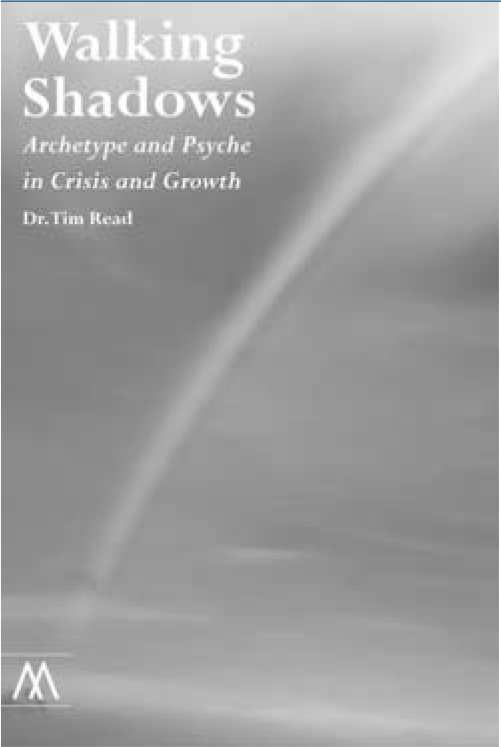
Walking Shadows is an unusual book. Tim Read is a clinical psychiatrist who has had a psychoanalytical training and he has thought deeply about his own and his patients' lives. The subtitle made me suspect that I was in for something weird, but I was wrong. It is a fascinating journey into the irreducible mystery of human existence in which Read asks us to suspend our contemporary demands for empirical evidence and nurture a sense of openness to the mind's ‘knowledge’. He takes the term archetype both from Plato and from Jung. Plato's archetypes were universal principles or essences, such as beauty, from which the world derives its visible form and meaning. In his parable of the cave, our world of sensation and experience is nothing more than a shadow reflected by the deeper reality of forms, ideals or archetypes. Having an archetypal experience means we walk up and out of Plato's cave into the dazzling light of reality. In the Jungian tradition archetype describes a deep, interconnected order of mind that is accompanied by extreme intensity of meaning. Self is described as Jung's ‘God term’ and as something akin to Plato's form of the Good. It is the underlying reality to all being and connects us in some fundamental, unconscious way. It is the ‘primal unity from which archetypes flow’. Thus, it is distinct from the ego or personal self. The ego helps us mosey along day to day and keep busy enough to avert our ‘gaze’ from these unbearably intense, collective depths. This is a deceptive calm, however, as the ego pits itself against Self.
If you are keeping up, this is where it gets interesting. Read describes archetypal experiences breaking into our mental life, usually in states of personal crisis or deep meditation, but sometimes unbidden. As the ego loses its battle against Self, an ‘archetypal crisis’ ensues that can be overwhelming, in either an intensely positive or negative sense. How we negotiate these crises leads to growth or devastation. And I mean devastation – the general reader needs a strong stomach to take in what Read's patients do to themselves when the outcome is destructive. Archetypal crises may last minutes, hours or days, but are regarded by Read as glimpses of the fundamental nature of reality. Thus, they often lead to a re-evaluation of one's life and its meaning. Read is fascinated by the idea of growth – what does it mean, when is it profound or superficial, and why does it matter? Is it our ability to experience Self unshielded by the ego and thereby grow to a new understanding of what it is to live fully? He interprets these crises in psychoanalytical language as processes in which the ego recedes and Self beckons from a deeper order connecting us all. Such numinous experiences evoke a sense of awe or terror and have enormous intensity of meaning. One has just walked out of Plato's cave into the light. Thus, how this fundamentally disorienting experience is navigated is crucial to its outcome. A poorly supported, disorganised experience leads to mental states psychiatrists regard as psychosis, while a journey that is revealing and organising points to enlightenment and maturity. Tim Read brings case histories from his work as a liaison psychiatrist in the Royal London Hospital, which has a major trauma centre, to this drama. He describes acute reactive psychoses in terms of archetypal experiences. When these are unbearably terrifying and disorienting, people may try to destroy themselves in violent ways.
This book goes at a pace from ancient Greek to 18th-century German philosophy, taking in Hindu and Buddhist thought, psychoanalysis, parapsychology and even the old tale ‘Jack and the Beanstalk’ on the way. It is clear, however, that Read is a disciple of Jung and Plato and he frequently returns to both. Jung survived what he regarded as a classical archetypal experience to reach the uplands of maturity and insight. Read even talks of his own numinous experience in childhood, in which a malevolently evil female face fixed his gaze with terrifying intensity. Although he still has little clear notion of the meaning of this dark vision, it is a vivid instance of the terrifying nature of such experiences. At one point my credulity was stretched to breaking point as he describes (while undergoing a guided ‘past life regression’) reliving a past life as a German soldier in the battle of Stalingrad. Although I admired his honesty in bringing this experience into the book, his account began to fray into a haze of suggestibility.
We now know that what we call psychotic experience is common in the general population and that mental illness is probably the extreme end of this phenomenon. Tim Read's suggestion is that its origin may be more mysterious than our current neuroscientific, neurocognitive or psychological theories allow. Whatever your philosophy, belief or life experience, this is an intriguing read. Although I am sure it will have its critics, it is a refreshing riposte to the materialist world view and you certainly will not be bored.





eLetters
No eLetters have been published for this article.